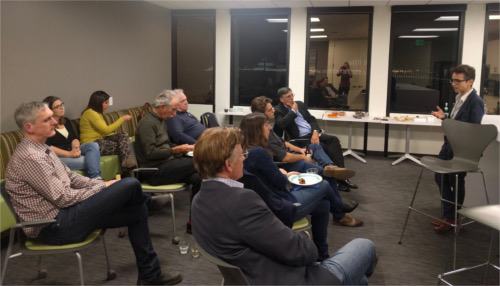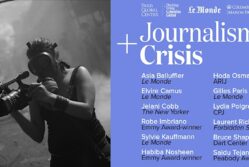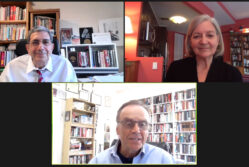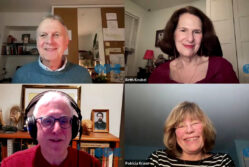Event Coverage Highlight

OPC/West Discusses Russia’s Role in the US Election

Masha Gessen, far right, speaks to attendees at an OPC/West panel in San Francisco. Photo: Mary Kay Magistad
By Mary Kay Magistad
In a US election year when Russia has played an unusually prominent role – from Donald Trump’s admiration of Vladimir Putin to strong suspicions of Russian hacking, two Russian journalists told an OPC/West gathering in San Francisco on Oct. 28 that the next US president needs to understand that Putin is an unpredictable opportunist. OPC/West is an informal affiliate of the OPC.
“Basing Russian policy on the assumption that Putin has predictable behavior, and that US policy will affect it, is a dead-end path,” said journalist Masha Gessen, author of “The Man Without a Face: The Unlikely Rise of Vladimir Putin,” and other books. “Putin’s actions are based on a belief of what the West is about, and they often play more to domestic sentiment than anything else.”
Joining Gessen was Elizaveta Osetinskaya, former chief editor of RBC Media Holding, Russia’s leading privately owned media group. She and two other senior editors were fired in May this year, weeks after RBC was the only major Russian media organization to cover the Panama Papers’ finding that a Russian businessman with ties to Putin had sent billions of dollars to offshore accounts.
“After we were fired, 50 people left my paper all at once,” Osetinskaya said. She is now a Knight journalism fellow at Stanford University, focusing on ‘how to create innovative and financially sustainable digital media for independent journalism, under tough political and economic conditions.’
And conditions are getting tougher for journalists in Russia who want to do real reporting, both Gessen and Osetinskaya said.
“Before the 2012 protests, the attitude was, ‘don’t bother with politics, and politics won’t bother you,’” Gessen said. “Now, everything is political.”
Osetinskaya agreed. “Many of my friends around my age, in their 30s and 40s, try to stay as far away from the state as possible,” she said. “Some have left, but I don’t believe all can leave the country.” She says hers is an interesting generation, because those in it experienced relative political freedom when young, and haven’t given up on the idea that they could have it again. ‘They are my best hope,’” she said.
Gessen, who now lives in New York with her family, and visits Russia periodically, sounded less hopeful, given the current level of censorship and suppression of dissent under Putin. “Hannah Arendt wrote that the difference between tyranny and totalitarianism is that in a tyranny, people are forced to pretend they believe something other than what they believe,” she said. “In a totalitarian state, people are robbed of the ability to decide for themselves what they think.”
A lively conversation with OPC/West members also touched on Putin’s efforts to enrich his offspring and build a dynasty, and at how relations among the US, Russia and China may play out in the coming years.
OPC/West, a group of about 70 current and former foreign correspondents based in the San Francisco Bay Area, first formed in the spring of 2016. Besides organizing gatherings and talks, the group also has a members-only Facebook page, through which members exchange ideas, articles and news about upcoming events that might be of interest to other journalists with an international background. New members are welcome.
Interested? Contact OPC members Markos Kounalakis at kounalakis@gmail.com, or Mary Kay Magistad at mkmagistad@gmail.com.
Related Events



